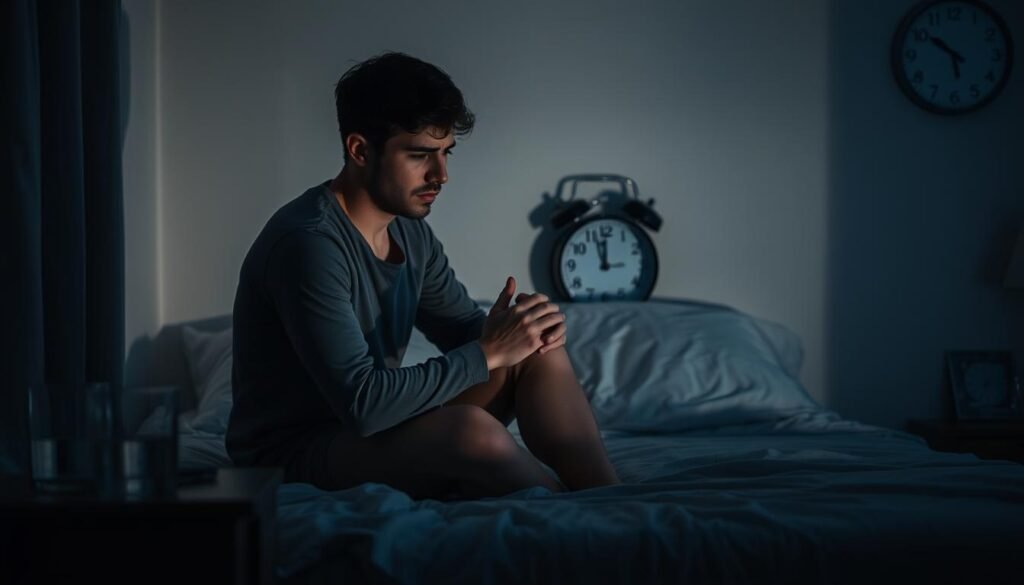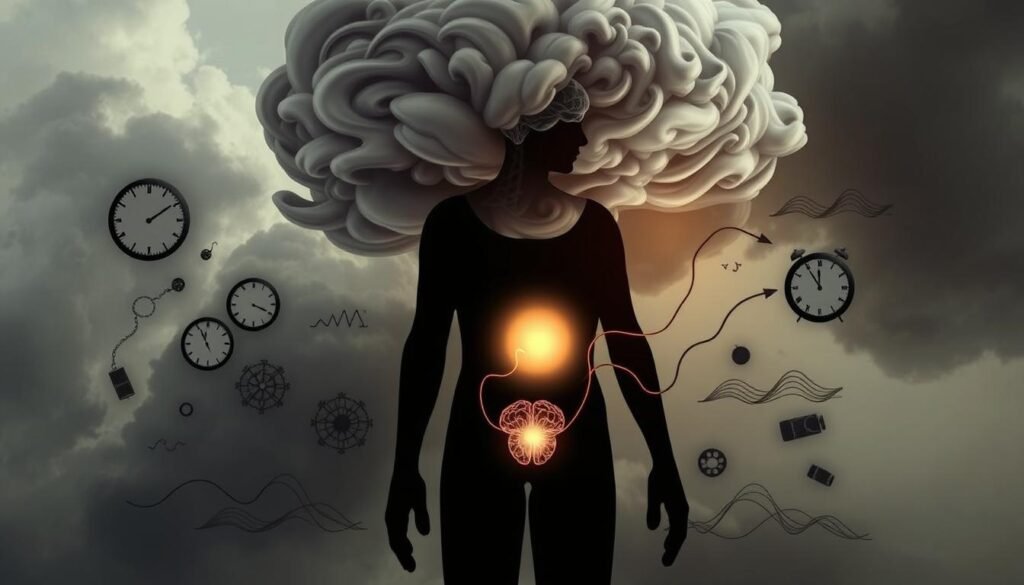Did you know frequent urination is a common symptom of anxiety disorder? It affects millions around the world. Researchers have found up to 20% of people might face this issue in their lifetime. This may include needing to urinate more than seven times in one day. Anxiety doesn’t just impact mental health. It can also play a big role in how well we control our bladder.
This article explores how anxiety and frequent urination are connected. It helps tell apart anxiety symptoms from other possible health issues. Knowing the link between mind and body is key to dealing with this symptom. This knowledge can lead to strategies that improve everyday life.
Key Takeaways
- Anxiety can lead to frequent urination, often exceeding seven times a day.
- Physical symptoms linked to anxiety can mimic other health disorders.
- Muscle tension plays a significant role in bladder control issues.
- Relaxation techniques, like Progressive Muscle Relaxation, can alleviate symptoms.
- Lifestyle changes can improve overall bladder and bowel health.
- Addressing chronic anxiety is crucial for reducing urinary challenges.
Understanding Anxiety and Its Physical Effects
Anxiety impacts both the mind and the body. It can lead to physical symptoms like a faster heartbeat, tense muscles, and stomach problems. Studies show that therapy can greatly improve these symptoms in just eight weeks. This shows the strong link between mental and physical health.
Interestingly, many with an overactive bladder also suffer from anxiety. Anxiety triggers the release of stress hormones, causing the kidneys to produce more urine. This results in a cycle where anxiety and the need to pee make each other worse.
Knowing how anxiety affects the bladder is key. Treatments like therapy, mindfulness, and some drugs can help manage it. Making lifestyle changes, like drinking less caffeine, also helps reduce the need to use the bathroom.
The connection between anxiety and physical health is deep. A study of over 16,000 women in Norway found that those with anxiety or depression were more likely to have urinary incontinence. This highlights the need to treat both the physical and emotional sides of anxiety.
Learning to handle anxiety effects can greatly better life quality. This is especially true for those with urinary problems from anxiety.
Common Anxiety Symptoms and Their Impact
Anxiety shows up in many ways, affecting our minds and bodies. People often feel worried, tense, and easily annoyed. These feelings can lead to muscle pain and a faster heartbeat. When anxiety gets worse, it can cause us to enter a fight-or-flight mode. This makes physical symptoms like the need to pee a lot more intense.
The link between anxiety and physical issues like frequent peeing is important. A study from 2016 found that people with Overactive Bladder (OAB) were more anxious. They also had worse bladder problems, highlighting how our emotions and body are connected. Stress can also cause symptoms like peeing a lot, needing to go urgently, and pelvic pain.
It’s key to understand how anxiety and our bodies interact. Anxiety can trigger our nervous system, which controls the bladder. This can make the bladder contract more, causing anxiety-related bathroom visits. Research shows that good habits, such as a regular pee schedule and less caffeine and alcohol, help with anxiety symptoms.
Dealing with anxiety means worrying about our body’s functions, like peeing. Worrying about the color or consistency of urine can make us even more anxious. Knowing about this cycle helps in managing anxiety better. This way, we can improve our mental and physical health.

| Common Anxiety Symptoms | Impact on Emotional Health | Impact on Physical Health |
|---|---|---|
| Excessive worry | Increased stress and anxiety levels | Muscle tension and fatigue |
| Irritability | Strained relationships and social interactions | Increased heart rate and blood pressure |
| Muscle aches | Decreased overall mood | Potential for chronic pain conditions |
| Increased urination urgency | Worsened feelings of loss of control | Disruptions in daily activities |
| Sleep disturbances | Exacerbated anxiety symptoms | Impaired physical health due to fatigue |
Does Anxiety Cause Frequent Urination
Anxiety often shows up as physical signs, including increased need to pee. The reason why anxiety and often peeing are linked is complex. It involves things like muscle tension and the body’s fight-or-flight reaction. Knowing about these processes helps understand why people feel this way when anxious.
Muscle Tension and Bladder Sensitivity
When you’re anxious, your muscles tense up. This can press on your bladder, making you want to pee more often. If you’re really tense, it can even make your bladder more sensitive. This leads to feeling like you have to go a lot. Research finds that people with anxiety are more aware of bladder feelings. This can start a cycle of needing to pee more when anxious.
The Fight-or-Flight Response
The body’s fight-or-flight reaction plays a big part in anxiety. It makes your nervous system ready to act, and can make you need to pee suddenly. Stress can also make bladder muscles thicker and nerves more sensitive. This makes the frequent urination issue worse. With your nervous system on high alert, you’re more aware of needing to pee, which can increase the urgency.
| Aspect | Muscle Tension | Fight-or-Flight Response |
|---|---|---|
| Physiological Impact | Pressure on bladder increases urinary frequency. | Stimulates nervous system, causing urgent urges. |
| Bladder Sensitivity | Increased sensitivity leads to more frequent bathroom trips. | Heightened awareness of bodily sensations amplifies urgency. |
| Long-term Effects | Potential for chronic overactive bladder symptoms. | May lead to ongoing stress and anxiety about urination. |
Types of Anxiety-Related Urination
Anxiety can show up in different ways, especially in how it impacts urinary habits. Two main kinds impact people: instant urination during stress and frequent urination that happens without drinking more fluids. Knowing the difference is key to dealing with these issues.
Instant Urination During Fearful Situations
Instant urination can happen right when someone feels fear or panic. If the body thinks it’s in danger, it gets ready for quick action, which can include feeling a need to pee right away. This kind of instant urination can be stressful and embarrassing, making it important to handle anxiety well.
Frequent Urination Without Increased Fluid Intake
Sometimes, people pee a lot even if they haven’t had a lot of liquids. Long-term anxiety makes the body always on alert, which affects the bladder. This can lead to feeling like you need to pee a lot, often due to stress, not because you actually need to go. Over half of people with stress issues also face urinary incontinence. Learning to manage stress through stress management techniques and therapy can really help.

Factors Contributing to Anxiety-Related Frequent Urination
Exploring the causes of anxiety-related frequent urination highlights a mix of bio and psychological factors. People with anxiety tend to go to the bathroom more often. This is due to evolutionary changes and conditions like an overactive bladder.
Evolutionary Adaptations in Stress Response
Why does anxiety cause frequent urination? It goes back to our ancestors. Being lighter helped them flee danger faster. Stress makes our brain ready our body to escape, causing muscle tension and a sensitive bladder.
Overactive Bladder Connection
Anxiety and bladder issues are closely linked. High anxiety can make an overactive bladder feel worse, starting a vicious cycle. More anxiety leads to more bathroom visits, increasing stress.

It’s key for both doctors and patients to understand these links. Knowing how stress responses and overactive bladder connect can improve how we tackle anxiety.
| Factor | Description |
|---|---|
| Anxiety Factors | Psychological triggers that increase bodily responses, leading to frequent urination. |
| Evolutionary Adaptations | Biological responses that evolved to enhance survival during stressful situations. |
| Overactive Bladder | A condition often exacerbated by anxiety, resulting in increased urgency and frequency of urination. |
Comparison: Anxiety-Related Frequent Urination vs. Medical Conditions
It’s important to know about frequent urination causes. This helps tell if it’s from anxiety or medical issues. Diseases like diabetes and urge incontinence have signs that can be mistaken for anxiety. Knowing these signs helps us figure out when to see a doctor.
Diabetes and Other Health Concerns
Diabetes can make you urinate more often. People with uncontrolled diabetes might shake, sweat, or have a fast heartbeat. These signs can look like anxiety. So, it’s key to watch for changes in how often you urinate. Other health problems like thyroid issues or COPD can also mimic anxiety signs, causing breathlessness and a fast heartbeat.
Understanding Urge Incontinence
Urge incontinence means you suddenly need to pee and might not make it in time. Anxiety can make this worse. People might confuse this with just feeling anxious. Muscle tightness and stress can make you feel like you need to pee more. It shows how our minds and bodies are linked in health.
Looking into how mental health affects peeing can help ease worries. Learning about this shows the link between our minds and our bladder health. This knowledge helps us care for both our mental and physical health better.
Managing Anxiety-Related Urination
People with anxiety-related urination issues can find relief through various strategies. This includes changes in lifestyle and coping mechanisms aimed at both anxiety and bladder troubles. These methods can improve quality of life and make symptoms less frequent.
Coping Strategies for Reducing Anxiety
Using certain coping strategies can greatly help in reducing anxiety. Techniques like progressive muscle relaxation, mindfulness, and therapy are very effective. They decrease anxiety levels and this reduces bladder problems. Therapy helps the brain and bladder to coordinate, easing symptoms of stress-induced urination. Also, some medications like SSRIs and antimuscarinic drugs may be prescribed. They help stabilize mood and ease bladder issues.
Lifestyle Changes and Relaxation Techniques
Making lifestyle changes is key to managing anxiety and its effects. Regular exercise, a healthy diet, and relaxation methods like yoga are beneficial. Yoga, for example, improves sleep and overall health. Including bladder control exercises in your routine boosts pelvic floor strength. This reduces urgent feelings and supports bladder wellness.
| Strategy | Description | Benefits |
|---|---|---|
| Progressive Muscle Relaxation | A technique involving tensing and relaxing muscle groups. | Reduces muscle tension and promotes relaxation. |
| Mindfulness | Practicing being present and aware of thoughts and feelings. | Helps in reducing anxiety and improving emotional regulation. |
| Yoga | Combining physical postures, breathing exercises, and meditation. | Enhances relaxation, improves sleep quality, and reduces stress levels. |
| Kegel Exercises | Strengthening pelvic floor muscles to improve bladder control. | Reduces urinary urgency and improves overall bladder health. |
By adding these strategies and changes to their daily life, people can see a big decrease in anxiety-related urination issues.
Conclusion
The connection between anxiety and frequent urination shows how our feelings deeply affect our bladder control. Managing anxiety is key in dealing with these symptoms, as it can improve our life quality. Knowing about this link helps people seek the right help and use good health strategies.
Studies show that many with urinary problems also have anxiety or depression. A recent study linked anxiety levels to how urgent the need to urinate felt. This highlights why treatments like cognitive behavioral therapy and pelvic floor exercises are so vital. By using these methods, people can ease their bladder issues and boost their mental well-being.
Adding activities like yoga and joining support groups helps with anxiety and builds community. Knowing and tackling anxiety that causes frequent urination can lead to a better life. It helps people gain back control over their everyday lives.